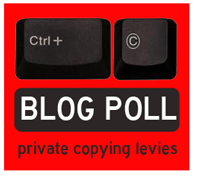 We have closed our second blog poll and we have counted the votes. First of all, it is heartwarming to see that more readers are concerned about the position of orphans than about private copying: whereas our first blog poll about the orphan works directive attracted a few thousand voters, this second poll closed with a result of just a few hundred votes.
We have closed our second blog poll and we have counted the votes. First of all, it is heartwarming to see that more readers are concerned about the position of orphans than about private copying: whereas our first blog poll about the orphan works directive attracted a few thousand voters, this second poll closed with a result of just a few hundred votes.
A fairly reasonable amount. Questions in online polls are often short and snappy, and we realize that our 8 questions about Ms Francoise Castex’s motion, Antonió Vitorino’s report and the implications of the Padawan decision were perhaps less easy to digest.
Summarized in short: According to the European Parliament, private copying levies benefit all parties concerned. We wondered if they really do and how a European private copying system should be organized.
The results show that harmonization is thought to be necessary and that some amendments should be made, but that revolutionary changes are not really wanted.
68% of the voters support the statement that only a harmonized private copying system is compatible with the objectives of the internal market. 67% thinks that the system of private copying levies should be made more flexible, to include virtual storage systems, such as cloud computing, as well.
With regard to alternative systems, 50% of the voters disagree with the statement that the system of private copying levies has become obsolete and should be replaced by a general copyright tax (20% is neutral on this point). 61% voted against replacing the system by a licensing system.
53% of the voters think that transferring the liability for paying levies from the manufacturer’s or importer’s level to the retailer’s level is not necessary to exclude digital reproduction equipment, devices and media that are clearly reserved for uses other than private copying. 62 % thinks that such a transfer would also result in an excessive administrative burden for small and medium-sized distribution companies and collective rights management organizations.
50% is positive about replacing the current ‘negative’ anti-piracy campaigns with ‘positive’ campaigns.
And finally, 63% ‘fully disagrees’ with the statement that the system of private copying levies is the worst form of fair remuneration, except for all those other forms that have been tried from time to time. (Similar to Winston Churchill’s famous dictum on democracy).
Full results:
Statement 1: Only a harmonized private copying system is compatible with the objectives of the internal market.
(“The divergent national ways of imposing and administering private copying and reprography levies have been a source of friction with the Internal Market principles of the free movement of goods and services for quite some time.” (report Antonió Vitorino)
Fully Agree: 37%
Agree: 31%
Neutral: 13%
Disagree: 8%
Fully Disagree: 8%
Statement 2: Transferring the liability for paying levies from the manufacturer’s or importer’s level to the retailer’s level is necessary to exclude digital reproduction equipment, devices and media that are clearly reserved for uses other than private copying.
(The motion considers that levies should be paid by manufacturers and importers and not transferred to retailers. This is contrary to what mediator Vitorino had suggested following the Padawan decision of the ECJ, which required that the level of the private copying levy be revised to reflect the distinction between private and professional users of media).
Fully Agree: 11%
Agree: 18%
Neutral: 23%
Disagree: 30%
Fully Disagree: 16%
Statement 3: Transferring the liability for paying levies from the manufacturer’s or importer’s level to the retailer’s level would result in an excessive administrative burden for small and medium-sized distribution companies and collective rights management organisations.
Fully Agree: 32%
Agree: 30%
Neutral: 20%
Disagree: 9%
Fully Disagree: 6%
Statement 4: Anti-piracy campaigns should be replaced with ‘positive’ campaigns highlighting the benefits of private copying levies.
(The motion stresses the need to make clear to consumers the role of the private copying system with regard to remuneration of artists and cultural dissemination and urges Member States and rightholders to replace their anti-piracy campaigns with ‘positive’ campaigns highlighting the benefits of private copying levies?).
Fully Agree: 18%
Agree: 32%
Neutral: 34%
Disagree: 9%
Fully Disagree: 4%
Statement 5: The system of private copying levies should be made more flexible, to include virtual storage systems, such as cloud computing, as well.
(Physical data carriers are used less frequently and the ‘primary use’ of media or equipment (computers, smartphones) is very often much broader than providing storage for copied material).
Fully Agree: 37%
Agree: 30%
Neutral: 13%
Disagree: 9%
Fully Disagree: 9%
Statement 6: The system of private copying levies has become obsolete and should be replaced by a general copyright tax.
Fully Agree: 13%
Agree: 13%
Neutral: 20%
Disagree: 18%
Fully Disagree: 32%
Statement 7: The system of private copying levies has become obsolete and should be replaced by a licensing system.
Fully Agree: 9%
Agree: 11%
Neutral: 16%
Disagree: 27%
Fully Disagree: 34%
Statement 8: The system of private copying levies is the worst form of fair remuneration, except for all those other forms that have been tried from time to time. (Similar to Winston Churchills famous dictum on democracy).
Fully Agree: 5%
Agree: 5%
Neutral: 10%
Disagree: 15%
Fully Disagree: 63%
________________________
To make sure you do not miss out on regular updates from the Kluwer Copyright Blog, please subscribe here.


